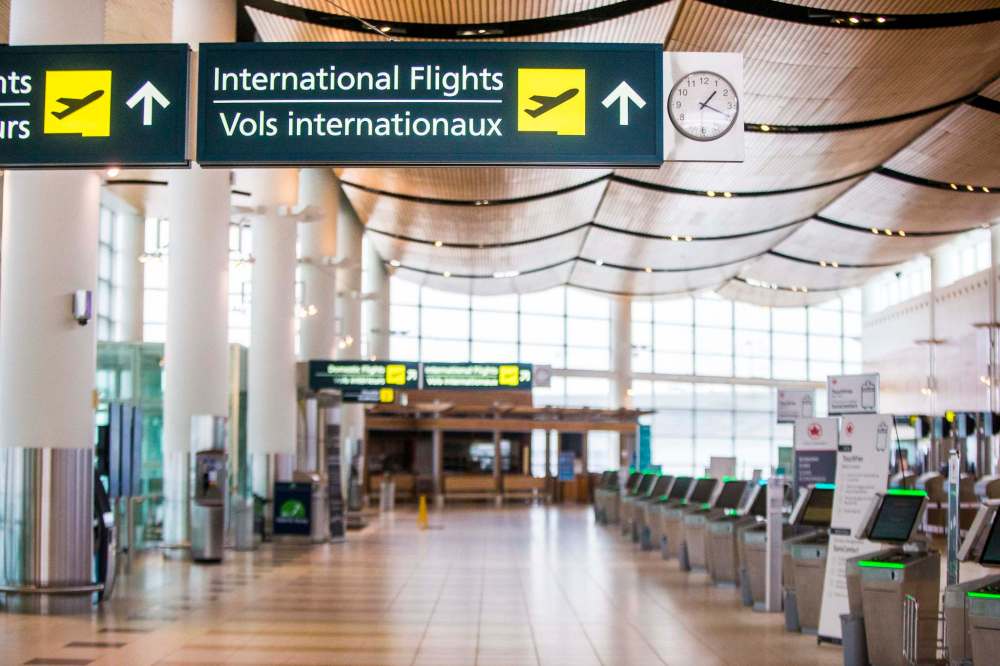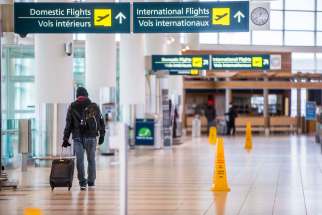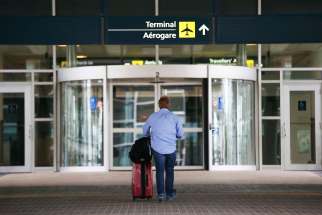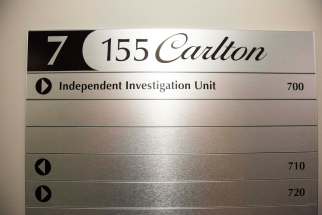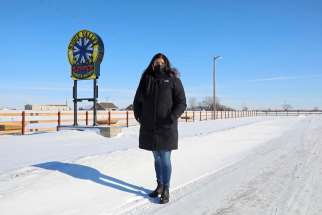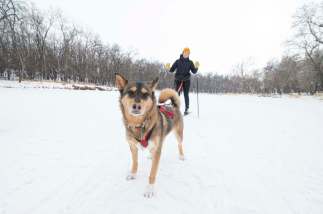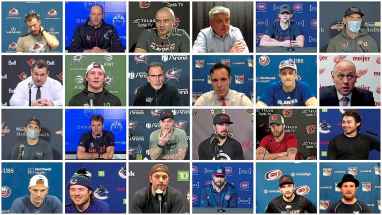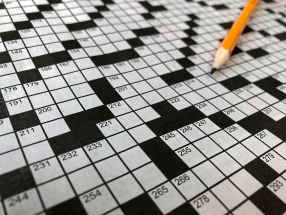Struggling airport hit by travel ban Federal restrictions 'will definitely finish off hundreds of jobs, if not thousands, across the country'
Read this article for free:
or
Already have an account? Log in here »
To continue reading, please subscribe:
Monthly Digital Subscription
$0 for the first 4 weeks*
- Enjoy unlimited reading on winnipegfreepress.com
- Read the E-Edition, our digital replica newspaper
- Access News Break, our award-winning app
- Play interactive puzzles
*No charge for 4 weeks then price increases to the regular rate of $19.00 plus GST every four weeks. Offer available to new and qualified returning subscribers only. Cancel any time.
Monthly Digital Subscription
$4.75/week*
- Enjoy unlimited reading on winnipegfreepress.com
- Read the E-Edition, our digital replica newspaper
- Access News Break, our award-winning app
- Play interactive puzzles
*Billed as $19 plus GST every four weeks. Cancel any time.
To continue reading, please subscribe:
Add Free Press access to your Brandon Sun subscription for only an additional
$1 for the first 4 weeks*
*Your next subscription payment will increase by $1.00 and you will be charged $16.99 plus GST for four weeks. After four weeks, your payment will increase to $23.99 plus GST every four weeks.
Read unlimited articles for free today:
or
Already have an account? Log in here »
Hey there, time traveller!
This article was published 29/01/2021 (1774 days ago), so information in it may no longer be current.
On the same day the prime minister announced a slew of sweeping measures to prevent non-essential travel and curb the spread of more infectious variants of COVID-19, Winnipeg’s airport released the final earnings report for a year marred by the pandemic.
All service to and from “popular sun destinations” in the Caribbean and Mexico has been suspended until the end of April, and any flights coming to Canada — passenger, private, charter and from the U.S. — will land at only four airports: in Vancouver, Toronto, Calgary and Montreal.
Mandatory tests, quarantine for air travellers

Posted:
OTTAWA - Winter-weary Canadians eyeing a vacation were told to spike travel plans Friday as Ottawa cancelled flights to popular sun destinations, and ordered all arrivals to test for COVID-19 and swallow hefty quarantine costs.
Travellers are ordered to quarantine in a government-approved hotel for up to three days at their own expense, as they await the results of a COVID-19 test taken at the airport. That could cost more than $2,000 per person, Prime Minister Justin Trudeau told reporters from the steps of Rideau Cottage Friday.
Those with positive tests will isolate in designated government facilities, while those with negative results can serve the rest of their two-week quarantine at home, said Trudeau. All travellers will also require another swab on Day 10, and airlines will help arrange the return of customers currently on a trip.
“We all agree that now is just not the time to be flying,” said Trudeau, adding Air Canada, WestJet, Sunwing and Air Transat are all on board with the new directives. “By putting in place these tough measures now, we can look forward to a better time when we can all plan those vacations.”
For Manitoba, that means the closest airport to fly into the province from overseas will be thousands of kilometres away, either in Alberta or Ontario. And it appears there will be no international outgoing flights either because of the new announcement.
The measures particularly impact departures and arrivals from Minnesota, which have been the only regularly scheduled international flights to Winnipeg from the U.S. Twin Cities of Minneapolis–Saint Paul since the onset of the pandemic.
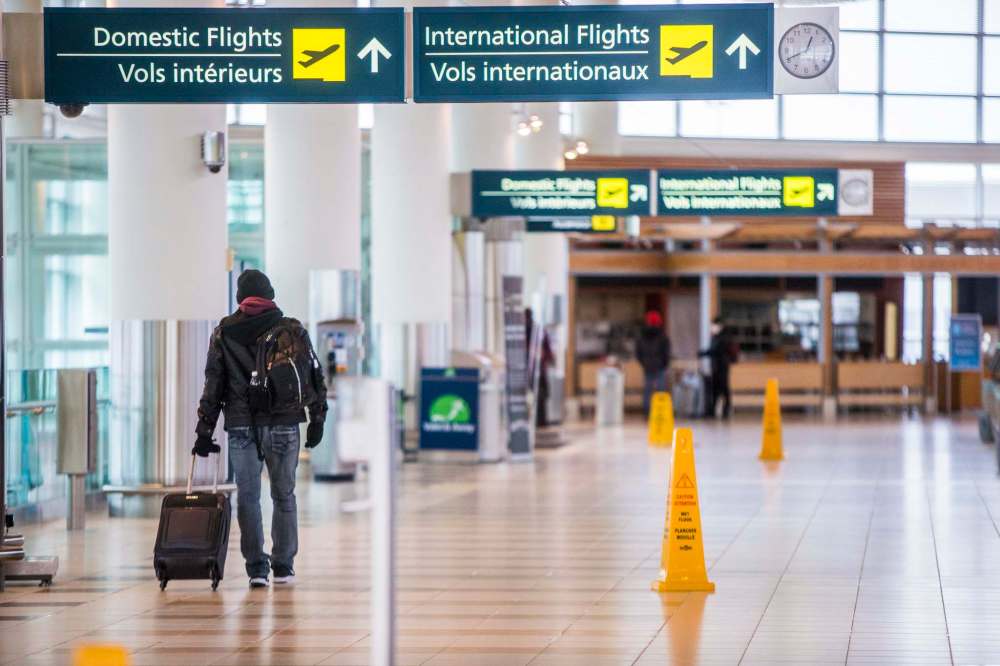
“But more than that,” said Barry Rempel, CEO and president of the Winnipeg Airports Authority, “even domestic air travel will likely be gridlocked because of this — which means even more losses for us.”
On Friday, the WAA’s fourth quarter results showed an 86.6 per cent plunge in passenger traffic. The airport said its earnings before interest, depreciation and taxes were $1.7 million in the fourth quarter of 2020. That’s compared to 2019, when the unaudited consolidated revenue was $33.9 million in the same period.
You’re outside Manitoba and you’re coming back. What happens now?
As the federal government announced new travel restrictions Friday, chief provincial public health officer Dr. Brent Roussin explained how the measures will affect Manitobans. Here’s a breakdown of what travellers should know.
If you’re outside the country and want to come back, you will first be tested for COVID-19 prior to your departure. Then, following a negative test, you will be allowed to fly into the country only through four major airports: in Vancouver, Calgary, Toronto and Montreal.
As the federal government announced new travel restrictions Friday, chief provincial public health officer Dr. Brent Roussin explained how the measures will affect Manitobans. Here’s a breakdown of what travellers should know.
If you’re outside the country and want to come back, you will first be tested for COVID-19 prior to your departure. Then, following a negative test, you will be allowed to fly into the country only through four major airports: in Vancouver, Calgary, Toronto and Montreal.
The closest airports to Winnipeg are in Toronto or Calgary. But the only way you can come back to Manitoba from those airports is by following a series of steps.
First, you will be tested at the Canadian airport at which you have arrived. While you await the results of that test, you will quarantine at a government-approved hotel for at least three days in the city at which you landed.
(It’s important to note that you will pay for your hotel at your own dime and, according to Prime Minister Justin Trudeau, it could cost upwards of $2,000.)
Only after you have tested negative will you be allowed to fly back or drive back to Manitoba from the city at which you were isolating. You will then have to finish off your two-week quarantine at your home location.
If you tested positive for COVID-19 at the airport at which you first arrived back in Canada, you will have to spend the rest of your two-week quarantine at a government-designated facility — which will likely be in the city at which you arrived.
On Day 10, you will be swabbed by a health official at the facility and following that test’s results, will be allowed to come back to Manitoba. If your test at the airport was negative and you’re quarantined at home in Manitoba, you will need to go get tested yourself on Day 10.
“We’ve been messaging for quite some time: we’re in a pandemic. This isn’t a time for non-essential travel,” said Dr. Roussin Friday.
“Right now, we need to focus on keeping these numbers down, preventing the importation of the virus and certainly the variants of concern, and then we can start focusing on getting things started again here, starting to open things up.”
— Temur Durrani
“Of course, we all want that safety aspect of things, nobody’s arguing that. But we were never really consulted on any of this,” Rempel told the Free Press. “What makes you think it’s any different isolating and getting tested in Toronto than it is in Winnipeg?”
Immediately after Trudeau’s announcement, Rempel said he heard from local hotels surrounding the airport who are “ready and eager” to become quarantine sites. He said he’s disappointed none of that was considered by the federal government.
“We have no idea what comes next,” said Rempel. “Shutdowns and closures are understandable, but where’s the plan? The feds have really told us nothing.”
Abby Gananendran had a layover in Winnipeg on a flight from Montreal to Calgary when he heard the news. “I’m just flying in for the weekend, and I’m defintely in favour of this,” he said, as he waited in line at an airport restaurant.
“The fact is, I’ve been seeing all my friends in Cancun and these other beachy places all over my Instagram for months,” he said. “They’re living their best lives, and I guess now the government’s finally saying, sorry, it’s still a pandemic.”

Gananendran suspects they will “continue living their best lives” and stay at those sunny destinations. “They’ve got nothing to lose, so why not ‘work from home’ from Mexico,” he said.
Winnipeg travel agent Christine Ward says she understands why the stringent measures might be the only way to ground passengers like that, who have been finding ways around previous restrictions.
“I haven’t had a single customer domestically or internationally since March,” said Ward, who used to have around 400 regular clients per year with at least a dozen more that were seasonal, prior to the pandemic. Those numbers, she added, are on par with several other top travel advisers in the country.
“I know that any inkling of travel that could have happened will definitely be halted just when people hear about that $2,000 hotel charge.”
“I haven’t had a single customer domestically or internationally since March.” – Winnipeg travel agent Christine Ward
Aviation experts say the measures are likely to trigger bankruptcies in Canada’s airline sector and force permanent closures for years to come.
Airline bookings had already dropped significantly this month after Ottawa announced travellers entering Canada would have to provide proof of a negative COVID-19 test prior to departure. The drop in demand prompted airlines to cut more routes and staff, with Air Canada laying off 1,700 workers this month.
Robert Kokonis, director of consulting firm AirTrav Inc. said he’s disheartened by the lack of aid with Friday’s announcement.
“It’s the nail in the coffin,” said Kokonis. “This will definitely finish off hundreds of jobs, if not thousands, across the country.”
The new measures go into effect Feb. 3, at 10:59 p.m. CST.
Twitter: @temurdur
Temur.Durrani@freepress.mb.ca

